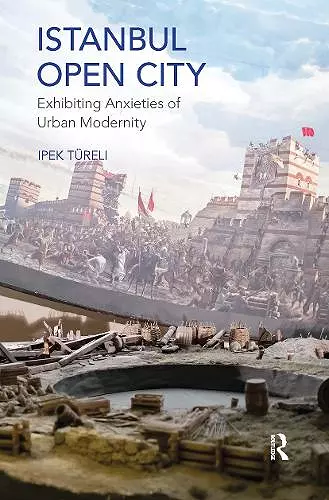Istanbul, Open City
Exhibiting Anxieties of Urban Modernity
Format:Paperback
Publisher:Taylor & Francis Ltd
Published:18th Dec '20
Currently unavailable, and unfortunately no date known when it will be back
This paperback is available in another edition too:
- Hardback£145.00(9781409422112)

Urban theory traditionally links modernity to the city, to the historical emergence of certain forms of subjectivity and the rise of important developments in culture, arts and architecture. This is often in response to technological, economic and societal transformations in the nineteenth- and early twentieth-centuries in select Euro-American metropolises. In contrast, non-Western cities in the modern period are often considered through the lens of Westernization and development. How do we account for urban modernity in "other" cities?
This book seeks to highlight cultural creativity by examining the diverse and shifting ways Istanbulites have defined themselves while they debate, imagine, build and consume their city. It focuses on a series of exhibitionary sites, from print press/photography, cinema/films, exhibitions of architectural heritage, theme parks and museums, and explores the links between these popular depictions through shared practices of representation. In doing so it argues that understanding how the future is imagined through images and interpretations of the past can broaden current theoretical thinking about Istanbul and other cities.
In line with postcolonial calls for a comparative urbanism that decouples understanding of the modern from its privileged association with Western cities, this book offers a new perspective on the lens of urban modernity. It will appeal to urban geographers and historians, cultural studies scholars, art historians and anthropologists as well as planners, architects and artists.
"Türeli’s exploration of anxiety proves a useful frame from which to understand responses to rapid urbanization and concerns over inclusions and exclusions in visions of the nation. Istanbul Open City is embedded in the question of representation and visual culture and thus most engaged with those who craft images, circulate Güler’s photographs, advocate for preservation, or design tourist attractions. It is these actors’ anxieties that are most visible, and the ways those anxieties play across class and ideological lines are less obvious."
- Ella Fratantuono, Journal of Urban History
"Overall, Istanbul Open City successfully reveals and explains the relationships between urban anxieties and the media through the thoughtful investigation of photojournalism, cinema, theme parks and museums. The book covers a large span of time from the 1950s to today, boasting an eclectic narrative. The book also functions as a reference work, with each chapter written as a stand-alone entry. When read in succession, however, the chapters establish continuity of affiliation between exhibition sites and their depictions of urban anxieties."
- Sezen Kayhan, Journal of Visual culture
"Istanbul Open City will interest students and scholars of the Middle East engaged in urban history, architecture, and the built environment, as well as those interested in questions of visual culture and cultural heritage. The bringing together of these often-isolated disciplinary fields is perhaps the greatest strength of the book, and the source of its many valuable insights into urban culture. I have no doubt that Türeli’s work will lead to more scholarly engagement with the concept of the ‘open city.’"
- Virginie Rey. Review of Türeli, Ipek, Istanbul Open City: Exhibiting Anxieties of Urban Modernity. H-Urban, H-Net Reviews. October, 2018.
"Istanbul, Open City provides a new way to think about the role that images play in shaping urban experience. In this careful exploration of the complex visual cultures that have defined Istanbul since the 1950s, Ipek Türeli both contributes to a rich body of scholarship on Istanbul and sketches out a methodological and conceptual intervention that should appeal to those studying how cities come to be experienced as rich sites—and sights—of meaning."
- Timur Hammond, Istanbul, Open City: Exhibiting Anxieties of Urban Modernity, The AAG Review of Books, 7, no. 3 (2019): 172-174, DOI: 10.1080/2325548X.2019.1615317
"Istanbul, Open City represents a rich contribution to contemporary literature on the city, and its original, multicase methodology should serve as a model of the innovative ways researchers can study urban environments in their many dimensions."
- Anne-Marie Broudehoux (2018). Istanbul, Open City: Exhibiting Anxieties of Urban Modernity. TDSR 29 no 2 (2018): 87-88.
"Istanbul, Open City offers two major contributions that I would like to highlight. First, bringing forth the perspective of the urban imaginary, the book offers insights into the scholarship on Istanbul, which has evolved dramatically over time. While the first generation of urban scholars in the 1960s and 1970s emphasized the problems stemming from rapid urbanization within the context of the developing economy, later research in the 1980s and 1990s shifted the lens toward the social, political, and spatial effects of globalization. Recently, a major strand within the field specifically explores the ways in which neoliberal urbanism has transformed the city’s physical and social space during the AKP era. It is against this backdrop that the book, by unpacking how subjectivities are produced and molded through an examination of urban imaginaries, engages with crucial aspects of urban modernity that have hitherto been understudied due to the hegemony of the perspective of urban political economy. Second, demonstrating continuities in terms of uncertainties embedded in urban experience, the book not only provides an account of modernity within a non-Western context, but also challenges methodological tendencies prevalent in Istanbul studies. Unlike the previous sociological, political, and architectural histories of the city, which have predominantly focused either on the modernization of the nineteenth-century Ottoman capital or the nation-building process of the early republican era, it examines communalities, overlaps, and tensions through a more expansive span of time from the 1950s to today and thus reconstructs a persuasive genealogy of the present."
- Firat Genç. İpek Türeli, Istanbul, Open City: Exhibiting Anxieties of Urban Modernity. New Perspectives on Turkey (2021): 1-4. doi:10.1017/npt.2021.7
ISBN: 9780367244118
Dimensions: unknown
Weight: 410g
224 pages